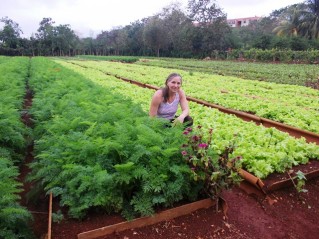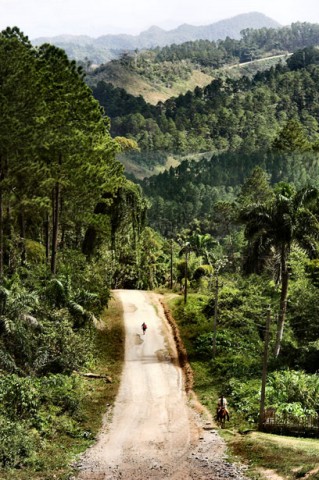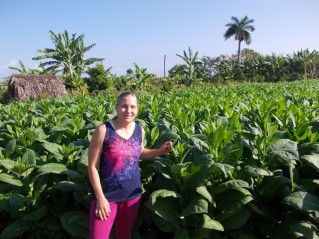Author Marjory Wildcraft told us recently she is a wild woman on a mission to put homegrown food on every table. The feisty 50-year-old rollerblader is not kidding.
To learn to grow food herself, Marjory has talked to more than a thousand, maybe 2,000, gardeners worldwide. This year, she went to Cuba to learn not only their gardening techniques, but how to grow food when your country’s entire agricultural and industrial system falls apart.
Marjory relays her extensive food-growing skills on her website and others, through her “Grow Your Own Groceries” videos and with numerous personal appearances. I have an entire cabinet of horticultural books, some dating to the late 1800s, and can probably recite many chapters from memory. Still, I learned totally new talents from Marjory’s videos, which cover everything from rainwater collection to butchering rabbits and eating bugs.
 Marjory, a former financial consultant, said that as the U.S. debt crisis looms scarier each day, she wanted to learn about surviving economic collapse from those who already lived through it. She figured the best way to witness Cuba’s recovery was to go there personally and talk to common gardeners and farmers.
Marjory, a former financial consultant, said that as the U.S. debt crisis looms scarier each day, she wanted to learn about surviving economic collapse from those who already lived through it. She figured the best way to witness Cuba’s recovery was to go there personally and talk to common gardeners and farmers.
What happened in Cuba could just as easily happen here. There are many parallels, she said.
“These are crazy and dangerous times,” Marjory said of the recent snafu with food stamp cards. With 47 million Americans on food stamps, there will likely come a time when the U.S. will not be able to provide benefits. “A lot of the riots that happen in big cities start at the welfare office when people can’t get their benefits.”
To learn more about preparing for such chaos, Marjory traveled to the island country, just 30 miles from the southern tip of Florida, with Millions Against Monsanto, a subgroup of the Organic Consumers Association, to talk with working-class Cubans about their transition to gardening.
Before the collapse 20-some years ago, Cuba relied on imported oil to grow its main export crop, sugar. Just like the United States, Cuba had been using large farm machinery and chemical fertilizers and pesticides to produce only a few types of crops.
“The big question,” Marjory asked, “was how do you feed 11 million people when your entire agricultural system no longer works?”
Economic collapse
Cuba’s collapse followed the Soviet Union’s dissolution in 1991, which immediately halted 80 percent of Cuba’s imports and exports. Besides petroleum, other important imports such as food, machinery parts, medicine and textiles, came to a halt. Also, the bottom dropped out of the sugar market for Cuba, partly because of the introduction of high fructose corn syrup.
 In time, Cubans got healthier growing their own food. But first, they suffered, even resorting to eating domestic pets and zoo animals, according to a Forbes news report. The buffalo, peacocks and rhea (a rare, flightless bird similar to an ostrich) turned up missing from the Havana zoo. Housecats also disappeared from city streets.
In time, Cubans got healthier growing their own food. But first, they suffered, even resorting to eating domestic pets and zoo animals, according to a Forbes news report. The buffalo, peacocks and rhea (a rare, flightless bird similar to an ostrich) turned up missing from the Havana zoo. Housecats also disappeared from city streets.
Soon after the collapse, Australian and other permaculturists distributed aid and taught their techniques to Cubans, who implemented them in former sugarcane fields, raised beds and urban rooftops across the nation, according to Cuba History.org.
The Cuban government mandated organic agriculture, ousting the old industrialized form of agriculture Cubans had grown accustomed to. Localization, permaculture, and innovative modes of mass transit were rapidly developed. Food consumption was cut back to one-fifth of previous levels. Although starvation was avoided, persistent hunger, something not experienced since before the Cuban Revolution, suddenly became a daily reality.
Poverty benefitted Cubans in some ways, however. Adults lost an average of 20 pounds, while cases of diabetes and high blood pressure declined as meat, milk and other dairy products became scarce. Walking and bicycling came back in style. And farmers reverted to using horses and oxen, which need only “grass and water and to be caressed.”
When imports end
Besides learning about crops and growing methods, Marjory sought Cubans’ advice for Americans preparing for economic collapse. Their answers surprised her.
“Every single one of them said something about being ready to share with your neighbors, to help out in your community and do your best to keep your spirits up,” Marjory said. “Not a single one said to go out and buy a bunch of stuff.”
Marjory said that instead of storing beans in bulk or buying guns, the Cubans did what people naturally do in times of stress – they grew gardens and shared with neighbors. Many of these community relationships were built upon generations.
After the revolution, the government gave Cubans property, but does not allow them to sell it. Unlike Americans who move on average every 5 years, Cubans generally live in one neighborhood for decades. As such, there is a very high level of connectedness with the people and very little violence, Wildcraft said.
“They are all family,” she said.
Now as old-fashioned gardeners who walk or pedal for transportation, Cubans are healthier, according to a British Medical Journal study.
Parallels with Cuba
Marjory noted several parallels between Cuba’s pre-collapse system and the current financial crisis in the United States. For instance, Cuba was highly dependent upon fuel imports. Similarly, America now imports 60 to 65 percent of its fuel.
“More than any other Latin American culture, Cuba embraced monoculture, which is what America definitely has, and that completely failed,” she said. Cuba relied mainly on sugar exports; when the sugar market dried up, Cuba had no other major cash crop. American also has lost crop diversity.
Another similarity, she said, is in U.S. reliance on large agricultural machinery and big farming enterprises. When Russian imports to Cuba halted, fuel and tractor parts were unavailable.
The common folks Marjory spoke with said the economic collapse “came as a big surprise they didn’t see coming.”
Marjory Wildcraft on ‘Beyond Off Grid’
Earlier this month, Marjory highlighted her experiences with a slide presentation on the first of a series of webinars hosted by the producers of “Beyond Off Grid,” a film documentary projected to be released in early 2014. The film, which includes more than a dozen agricultural, economic and homesteading specialists, strives to help people reduce their dependency on the modern control grid. Incidentally, Darren was filmed here in May talking about water issues and the mistake of relying on technology to pump water.
 Film producer Jason Matyas, a lifelong gardener, spoke with Marjory on the 1-hour program about the municipal and private food plots she toured during her 10-day trip to Cuba.
Film producer Jason Matyas, a lifelong gardener, spoke with Marjory on the 1-hour program about the municipal and private food plots she toured during her 10-day trip to Cuba.
Cubans ate a lot of rice, beans and pork before 1991, Marjory said. All of their rice was imported. Post-collapse, Cubans began eating more vegetables and fruit they grow themselves. They learned to improve their predominantly clay soil by composting and now raise produce and small livestock wherever possible.
“The Cubans did what people all over the world do when in crisis – they started growing food on windows, in backyards, and on corner lots,” Marjory said. “They use all the classic techniques from organic gardening such as composting, vermiculture, companion planting and crop rotations. Why? Because it works.”
Dependence on oil
During the program, Jason explained how an attack on Iran by the United States or Israel could almost immediately double or triple fuel prices as Iran likely would close its main shipping lane, disrupting oil transports.
“Whether that kind of scenario happens or not, the more local you can make your food supply, the better,” Jason said. “The ultimate is growing your own food.”
The next best thing, Jason said, is to trade among neighbors, followed by purchasing from a local farmer where you know the production methods.
“The question is no longer ‘if.’ The question is ‘how’ and ‘how quickly’” Jason said of U.S. economic collapse.
Marjory added that in a crisis, skills are much more valuable than goods. The items usually becoming scarce first are food, seeds, transportation, clothing and medicines. People should also consider how they will do without their addictions (such as chocolate, liquor or coffee).
“These are all patterns that happen fairly predictably,” Marjory said, urging people to begin gardening now. “Growing food is not a skill you can learn quickly or easily.”
Besides gaining self-sufficiency skills, your physical health also will be rewarded as much industrial food isn’t good for us anyway.
To see Marjory’s video interviews with Cuban farmers and gardeners and see more photos, visit her website.
© 2013 Well WaterBoy Products LLC ♦ WaterBuck Pump™ ♦ Pedal Powered PTO™

